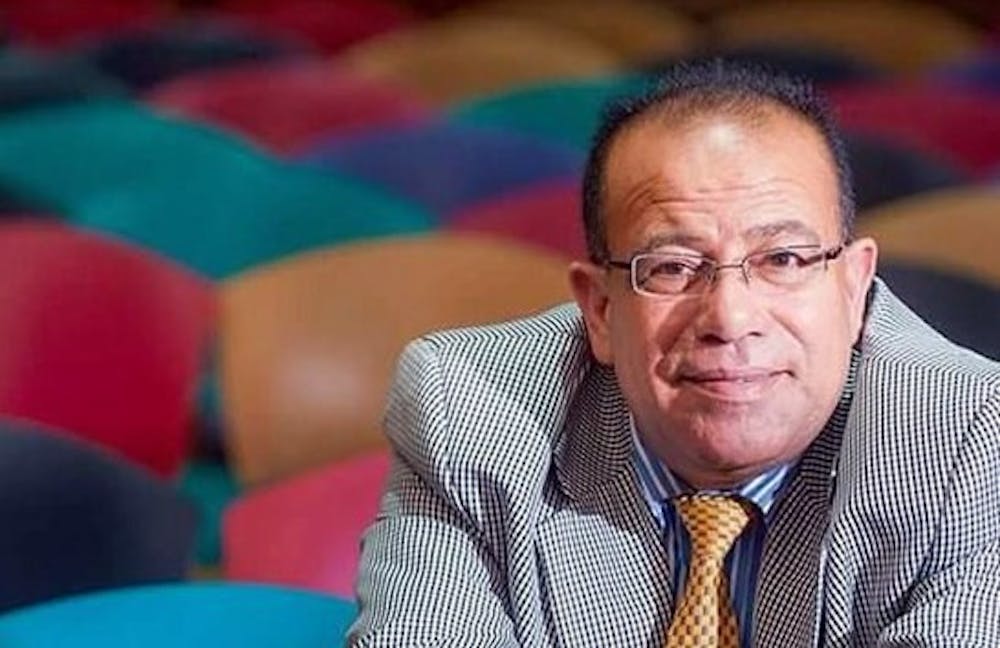Human rights activist Bassem Eid, a Palestinian, discussed the Israeli-Palestinian conflict on the Gaza Strip and voiced his opinions on Palestinian leadership in an event hosted by Students Supporting Israel Sunday.
Eid is the chairman of the Center for Near East Policy Research, which focuses on Israel-Arab Relations. In 1996, he founded the Jerusalem-based Palestinian Human Rights Monitoring Group, which shut down in 2011. He is also a political analyst for Israeli TV and radio.
“I am a person who is very pessimistic towards any solution or future solution to the Israeli-Palestinian conflict, at least for the coming two or three generations,” Eid said. “Then probably, a charismatic leader, a courageous leader, will be born, and will be able to solve this long-term conflict.”
Eid explained the Gaza Strip’s central importance to Israeli-Palestinian conflict. According to Eid, the violent clashes between Israel and Hamas, a Palestinian military group, earlier this year have benefited the Gaza people, the majority of whom are Palestinian Arabs. After a ceasefire was negotiated by Egypt, Egyptian President El-Sisi met with former Israeli Prime Minister Naftali Bennett.
Using Egypt’s position as a peace mediator, El-Sisi was able to make Israel take up more responsibility for the Gazan economy. Israel granted working permits to those in the Gaza Strip which resulted in tens of billions of shekels, the Israeli currency, flowing into the Gaza Strip. However, Eid believes these numbers to be somewhat misleading.
“Where [are those billions of shekels] spent? In digging tunnels and military capability,” Eid said.
By emphasizing the humanitarian situation for Palestinians in Gaza, Eid attempted to clarify what he sees as misconceptions of what the ordinary Palestinian wants. According to Eid, the top priorities for an ordinary Palestinian are to survive and to secure the education and health systems for their children.
“The majority of the Palestinians these days are people who are seeking dignity rather than identity,” Eid said.
Eid asserted that Hamas is destroying the Gaza Strip and that new leadership is required to manage the region correctly. After Israel ended its 38-year occupation of the Gaza Strip in 2005, Hamas has been the de facto governing authority of the region.
Eid then went on to discuss the economic prospects of Palestine, describing the Abraham Accords as “very important” in both the economic and political aspect of its effects. The Abraham Accords were a series of joint normalization statements between Israel, the United Arab Emirates and Bahrain that went into effect in September 2020.
He believes that, contrary to what the Palestinian leadership thinks, the United Arab Emirates' investment of billions of dollars in Israel will benefit Palestinians by creating factories and jobs in Israel.
In response to a question from an audience member about whether he has tried talking to pro-Palestinian organizations at universities, such as Boycott, Divestment, and Sanctions (BDS) or Apartheid Week, Eid accused these organizations of refusing to have a dialogue with him.
“Those people [live] in their warm houses, you know, in Virginia, Los Angeles, in the UK and they have no problem from time to time to give a speech on behalf of the Palestinians,” Eid said. “They are using us. The BDS movement is people who used to be jobless and they found a job forever. If the Israeli-Palestine conflict [was] solved, all of the BDS members will be jobless and refugees.”
Eid then called out groups like Students for Justice in Palestine and Jewish Voice for Peace, claiming they tell lies to “satisfy their own political interests rather than solve the Israeli-Palestinian conflict.”
“What do the Palestinians benefit from BDS? Zero. Several factories in Israel have been closed, thousands of Palestinian workers have been thrown out from their job,” Eid said.
To close out the event, Eid responded to a question about what America’s role is in the Israeli-Palestinian conflict. Eid said that he is unsure, though both Israelis and Palestinians become very optimistic around every American election as they believe that every new leader is going to solve the conflict.
Eid praised Trump’s 2020 Peace to Prosperity plan, which Trump dubbed the “deal of the century.” The plan, which defined the future of Israeli settlements and how Palestinians might conditionally form a state, was rejected by Palestinians.
Get The Chronicle straight to your inbox
Signup for our weekly newsletter. Cancel at any time.

Jazper Lu is a Trinity senior and centennial/elections editor for The Chronicle's 120th volume. He was previously managing editor for Volume 119.

